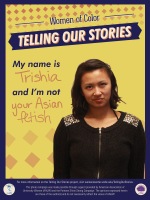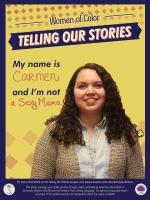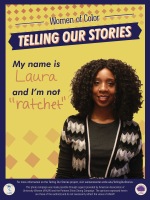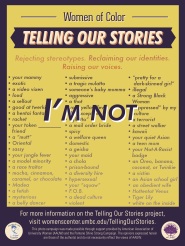 We’re proud to announce that the Women’s Center at UMBC and Women of Color Coalition were recently awarded a $5,000 grant from the American Association of University Women (AAUW). The 2014–15 AAUW Campus Action Project (CAP) grants, sponsored by Pantene’s Shine Strong campaign, fund student led projects that fight stereotypes and biases.In addition to the AAUW CAP grant, we were also awarded a $500 community project grant from BreakingGround to help support this ambitious campaign.
We’re proud to announce that the Women’s Center at UMBC and Women of Color Coalition were recently awarded a $5,000 grant from the American Association of University Women (AAUW). The 2014–15 AAUW Campus Action Project (CAP) grants, sponsored by Pantene’s Shine Strong campaign, fund student led projects that fight stereotypes and biases.In addition to the AAUW CAP grant, we were also awarded a $500 community project grant from BreakingGround to help support this ambitious campaign.
Our project, called “Telling Our Stories: I’m Not/I Am,” aims to 1) raise awareness and reject stereotypes about women of color, and 2) create space for women of color voices and counternarratives. Following a series of consciousness-raising discussions over the past year, many of our students saw the need to promote visibility and community-building among WoC in order to stand in solidarity against racist and sexist microaggressions. First-year student Jahia Knobloch vividly describes the harmful impact that stereotyping can have on women of color:
Women of color are blessed with so many gifts: our beauty, compassion, ingenuity and grace are unparalleled. But too often our gifts are ignored, with ruthless stereotypes and myths being built around our existence which casting us into either unthreatening or highly exoticized and eroticized roles.
My first realizations about what it means to be a woman of color came, as so many realizations do, because of discrimination. Around the age of fourteen, I began receiving attention from boys and men. Many of these attentions were flattering; some were offensive and others downright menacing. But some of the most memorable comments I received were from non-POC boys and men. These comments were memorable only in their flabbergasting ignorance about what being attracted to a women of color apparently means in the minds of non-POC boys and men. Some examples: “I’ve never been with a Black girl before,” “You’re so pretty because you’re mixed—you’re lucky you only got the good features of being Black,” “I love your hair, it’s so dark,” and the jaw-dropping “I love the way your dark skin looks against my white skin.” Really dude?
I came to realize that as a woman of color, you are forced by proxy to represent the exotic “other”—a taste of a world in which non-POC men dare not venture into past a certain point. Even with our own races, we can be subjugated to lesser roles because of our status as women. Yet what those who wish to make us less-than do not see is that we can be the strongest of champions: not only for ourselves, but for our people and all those who are oppressed. We are a force to be reckoned with.
For me, dismantling stereotypes is so important because it gives us as WOC a chance to show that there is no “other.” We will not be your African, Asian, Latin, Native American or interracial vacation to the dark continent. We will not be a stop on your experimental college road trip for you to regale your friends about. We will not be a tourist attraction, an item on your bucket list or a milestone. We will only be us: beautiful, intelligent and independent. We will only be as strong as we have been made to be from centuries of oppression. We will continue to carry our status as WOC not as a burden, but as a gift. We will tell our stories. We will be heard.
By launching the project with the “I’m Not” poster campaign, we hope to disrupt the misguided assumption that racialized gender stereotyping is not a problem for our campus community. Click here to see the latest posters from the campaign!
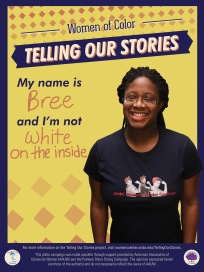 The second phase of the project consists of creative skill-building workshops which will culminate in a “Telling Our Stories: I Am” showcase. We intend to go beyond challenging the misrepresentation of women of color and actually create a platform dedicated to their authentic self-representation. Women of Color Coalition member-at-large Bree Best explains the importance of storytelling:
The second phase of the project consists of creative skill-building workshops which will culminate in a “Telling Our Stories: I Am” showcase. We intend to go beyond challenging the misrepresentation of women of color and actually create a platform dedicated to their authentic self-representation. Women of Color Coalition member-at-large Bree Best explains the importance of storytelling:
Not only does telling your story tell people who you are but It give a different perspective of how to view things. These stories are needed and you, woman of color, have the pen in your hand ready to write it.
At the end of the showcase, I don’t want the conversation of women of color telling their stories to stay stagnant. I want this to continue because there are many “untold stories” in the woman of color sphere that need to be heard. These need to be heard so that they can help heal the multigenerational hurt that women of color have accrued. I believe if we tell our stories people will understand better how to heal or not hurt us through racial interactions.
The Telling Our Stories showcase will celebrate the creative self-expression of women of color and empower them to reclaim their own narratives. The showcase will be held on Wednesday, April 29th from 6-8pm in the Commons Sports Zone.
Be sure to like Women of Color Coalition on Facebook and follow us on Tumblr for more news and updates on the Telling Our Stories project!
